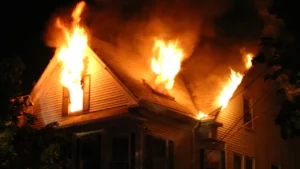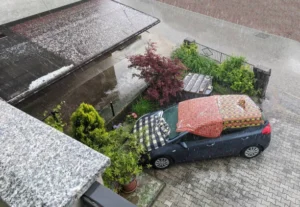The unmistakable stench of smoke in your home isn’t just unpleasant—it’s invasive. Whether it’s from cigarettes, wildfire exposure, or the aftermath of a house fire, knowing how to get smoke smell out of house spaces is a must for homeowners across Houston and the rest of Texas. The particles left behind don’t just linger in the air—they bury themselves deep in your walls, fabrics, vents, and furniture.
At TX Public Adjusting, we’ve worked with countless homeowners tackling smoke damage. If you’re stuck with that smoky scent and wondering where to start, this is packed with actionable steps that go beyond surface-level solutions.
1. Start with the Source: Understand Why Smoke Smell Sticks Around
Smoke odor isn’t a single compound—it’s a toxic cocktail. We’re talking about over 400 components, including ammonia and acetic acid. These nasty bits bind with oil and tar, gripping onto surfaces like walls, carpets, upholstery, and even inside your vents. And the worst part? The smell doesn’t stay where the fire or smoke was. It spreads—behind drywall, under floors, and into spaces that never even saw flames.
If your home in Texas has recently been through a fire or long-term smoke exposure, a basic cleaning won’t cut it. You’ll need to dig deep and go methodical. That’s where this plan begins.
2. Let Your Home Breathe: Ventilate First
Before you reach for cleaners or gadgets, open those windows. Airflow is your first defense.
- Crack open every window and door.
- Set box fans facing outward in your largest windows.
- Leave interior doors and even kitchen cabinets open.
- Let the Texas sun do its part. UV rays help neutralize odors naturally.
If the weather cooperates, keep this going all day. You’re not just airing out the home—you’re setting the stage for deeper odor removal.
3. Make Preventative Habits Your Best Friend
Odor prevention goes hand-in-hand with elimination. Start adopting these daily habits immediately:
- Empty all ashtrays—don’t let the smell fester indoors.
- Stop smoking inside (yes, even just “by the door”).
- Smoke particles cling to your clothes, so store worn items away from clean fabrics.
Consistency here will make every other step more effective.
4. DIY Deodorizing Powerhouses You Already Own
Here’s where the elbow grease comes in. These common household items work—if used correctly.
Baking Soda
This pantry staple doesn’t mask smells—it absorbs them.
- Sprinkle baking soda on carpets and upholstery, leave it for at least 8 hours, then vacuum thoroughly.
- Place bowls of baking soda in smoky rooms for several days.
- Use it in a trash bag with books, clothes, or other small items that need odor control.
White Vinegar
White vinegar’s low pH alters smoke molecules—making it ideal for neutralizing odor.
- Place bowls of vinegar around the home overnight.
- Simmer it on the stove for 1–2 hours to deodorize the air.
- Wipe down walls, counters, and cabinets with a vinegar solution. Let it dry fully.
Activated Charcoal
Available at most Texas home improvement stores, this is a step up from your grill charcoal.
- Place charcoal bags in smelly rooms, on furniture, or inside drawers.
- Let them sit undisturbed for a few days.
Don’t dump loose charcoal on fabric—it stains.
Ammonia (Caution!)
When vinegar and baking soda aren’t enough, ammonia brings out the big guns.
- Mix 1 cup ammonia with 3.5 liters of water.
- Scrub hard surfaces like tile, but never use it on wool or silk.
- Ventilate aggressively while using ammonia. Gloves and eye protection are a must.
Never mix ammonia with bleach.
Alcohol (Vodka or Rubbing Alcohol)
Smoke gets into walls and ceilings—yes, even the paint.
- Spray vodka onto the walls and wipe it down after 10 minutes.
- Use rubbing alcohol with a soft cloth for plaster walls or tricky areas.
5. Deep Cleaning: It’s Time to Go All In
Surface cleaning won’t remove embedded smoke particles. Now’s the time to dig deep:
- Steam clean carpets, rugs, and upholstery. If possible, hire a service in your local Texas area.
- Wash all washable fabrics—bedding, curtains, towels, and stuffed animals—with vinegar in the wash cycle.
- Vacuum every nook—under furniture, between cushions, along baseboards.
- Clean glass, mirrors, tiles, and countertops with a vinegar-water solution.
- Don’t forget walls and ceilings. Smoke rises!
Pro tip: Don’t dry clothes that still smell smoky. It sets the odor permanently.
6. HVAC and Air Purification—The Unsung Heroes
Let’s talk air systems. If smoke has made its way into your vents or ducts, your whole house is constantly recirculating that odor.
- Change your HVAC air filters immediately (quarterly at a minimum; monthly if you’re dealing with smoke).
- If your system supports it, upgrade to HEPA filters.
- Get your air ducts professionally cleaned, especially if you’ve experienced a major fire or chronic smoking indoors.
TX Public Adjusting works with licensed HVAC professionals across Texas, so reach out if you’re unsure where to start.
7. Additional Tools That Work
These bonus tips can boost your efforts:
- Bowls of coffee grounds work like baking soda—especially in kitchens or cars.
- Air purifiers with HEPA filters help reduce lingering particles, especially in bedrooms or smoke-dense rooms.
- Dehumidifiers help by reducing moisture, which makes odors cling more easily to surfaces.
- Essential oil diffusers or scented candles can mask odor temporarily—but always pair them with real cleaning.
8. Severe Damage? Bring in the Professionals
Sometimes the odor wins—especially after house fires, wildfire smoke infiltration, or months (even years) of indoor smoking. If your efforts fall short, it’s time to call for help.
TX Public Adjusting works with homeowners across Houston and greater Texas who need smoke remediation services. We assess the severity of damage, recommend trusted professionals, and help you file the right claims to cover cleaning, replacement, and even temporary relocation if needed.
If ozone treatment is necessary, don’t attempt it alone. These machines are powerful and dangerous if misused. Our team can help you coordinate safe, certified service.
9. Prevention Is the Final Step
Once you’ve finally removed the odor, here’s how to keep it away:
- Smoke outside only—and store smoky clothing in airtight bins.
- Use vinegar, charcoal, or baking soda around the home weekly.
- Change HVAC filters regularly.
- Keep an air purifier running in the highest-risk areas.
- Clean hard and soft surfaces routinely—don’t wait for the smell to come back!
Final Thoughts: Breathe Easy, Texas
Knowing how to get smoke smell out of house environments isn’t just about comfort—it’s about reclaiming your space and protecting your health. The process can be labor-intensive, sure. But with persistence, the right tools, and guidance from a team like TX Public Adjusting, that lingering smoke smell doesn’t stand a chance.
Whether you’re recovering from a fire or dealing with chronic indoor smoke exposure, we’re here to help Texans take back their homes—one fresh breath at a time.
Need help filing a smoke damage claim or coordinating professional remediation? Reach out to TX Public Adjusting today.
Frequently Asked Questions (FAQs)
Start by opening all windows and doors to allow fresh air circulation. Use fans to push smoky air out, and place odor absorbers like baking soda or vinegar around the house.
Yes, baking soda is a natural deodorizer that absorbs, not masks, odors. Sprinkle it on carpets or upholstery and leave it for several hours before vacuuming.
White vinegar neutralizes smoke molecules due to its low pH. You can wipe down surfaces with it, place bowls around the house, or simmer it on the stove to freshen the air.
Absolutely. Change your air filters immediately and consider a professional duct cleaning. HEPA filters are recommended if your system allows it.
Ammonia is effective but must be used carefully in well-ventilated areas with protective gear. Never mix it with bleach, and avoid using it on delicate fabrics like wool or silk.
Persistent smoke smells may require professional remediation. TX Public Adjusting can help connect you with trusted services and assist in filing insurance claims for smoke damage.
Air purifiers with HEPA filters can reduce airborne smoke particles but may not fully remove odors embedded in surfaces. Use them alongside cleaning methods for best results.







